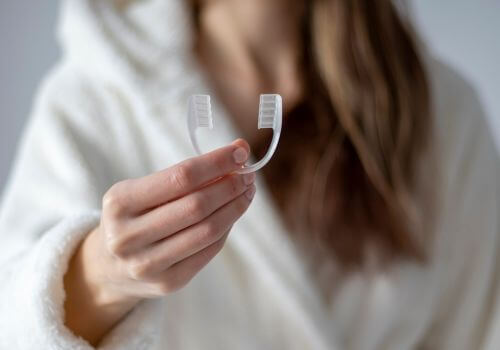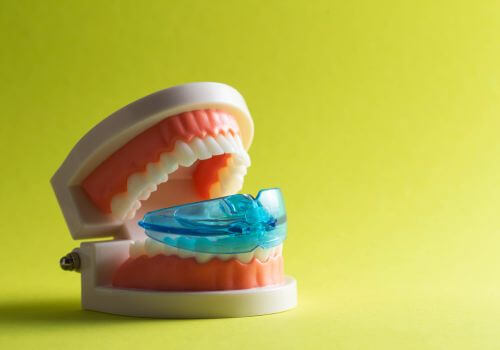If you wake up with jaw pain or headaches, it could be due to grinding your teeth at night. This condition is known as sleep bruxism and affects approximately 10-15% of adults. Stress, anxiety, misaligned teeth, certain medications, and disorders like sleep apnea can all contribute to nighttime grinding. With a force of up to 250 pounds — far more than normal chewing — grinding damages tooth enamel, causes jaw pain, and creates other oral health problems. As dental professionals, we’re here to help you recognize the signs and determine whether a night guard could be the best solution to protect your smile.
Common Signs of Nighttime Teeth Grinding
Wondering if you grind your teeth while sleeping? Watch out for these common signs of sleep bruxism:
-
Morning headaches, especially around your temples
-
Jaw soreness or facial pain when you wake up
-
Worn, flattened, or chipped teeth
-
Increased tooth sensitivity
-
Sleep disturbances (including grinding noises that may wake you or your partner)
-
Sores or cuts inside your cheeks
Early detection is key to preventing serious damage. If you notice any of these symptoms, schedule a dental appointment to address the issue.
How Night Guards Protect Your Teeth
Night guards form a protective barrier between your upper and lower teeth. Made from durable plastic or acrylic materials, these oral appliances absorb grinding forces and prevent direct tooth-to-tooth contact.
As dental professionals, we recommend custom-fitted night guards over store-bought options because they provide superior protection, comfort, and longevity. Custom guards match your exact dental anatomy, distribute pressure evenly, and stay securely in place throughout the night.

Types of Night Guards Available
Night guards come in different types to suit various grinding needs. Soft night guards are comfortable and ideal for mild grinders, though they typically last 1-3 years with proper care. Dual-laminate night guards combine a soft inner layer with a hard outer layer, offering a balanced mix of comfort and durability for moderate grinders, lasting 3-5 years.
For severe grinders, hard acrylic night guards provide maximum protection and have a lifespan of 5+ years. However, they are less comfortable than the other types and may require a longer adjustment period. Your dentist will help determine the best option based on the severity of your grinding and your specific needs.
The Custom Night Guard Process
Getting a custom night guard is a process. First, your dentist evaluates your teeth, jaw, and grinding patterns. They also ask about your symptoms and how grinding impacts your life. Next, they take digital scans or physical impressions to capture the exact shape of your teeth. These impressions go to a dental lab where technicians create your custom night guard.
Once your night guard arrives, you will return to the dental office for a fitting appointment to ensure proper fit and comfort. Follow-up visits allow your dentist to check the night guard’s effectiveness and make any necessary adjustments.
Benefits of Wearing a Night Guard
Consistent night guard use offers numerous advantages. Most obviously, a guard prevents tooth damage by protecting enamel from wearing down and reducing the risk of chips, cracks, and fractures. They also safeguard existing dental work, like crowns and fillings, against grinding damage. By absorbing grinding forces, night guards alleviate jaw pain, morning headaches, and facial muscle fatigue.
Many patients — and their partners — report improved sleep quality without grinding noises and interruptions. Perhaps most importantly, guards help maintain proper jaw alignment and reduce stress on the temporomandibular joints (TMJ), preventing temporomandibular disorders (TMD). From a financial perspective, a night guard costs significantly less than treating extensive dental damage from untreated grinding.
Proper Night Guard Care and Maintenance
Proper maintenance is essential for extending the life of your night guard and keeping it hygienic. Rinse it with warm (not hot) water before and after each use, and gently brush it daily with a soft toothbrush. Avoid using toothpaste, as its abrasiveness can lead to premature wear. After cleaning, allow the night guard to dry completely, then store it in its case.
For a deeper clean, do this at least once a month (weekly is even better). Soak your night guard in white vinegar for 30 minutes, rinse with warm water, then soak it in hydrogen peroxide for another 30 minutes. Afterward, rinse it again and let it dry fully. Alternatively, you can use a non-abrasive denture cleaner. Whichever method you choose, never soak your guard for more than an hour.
To avoid damage, keep your night guard away from hot water and direct sunlight, as both can cause warping. Bring it to your dental appointments for professional cleaning, and replace it when signs of wear appear. When not in use, store it in its case in a cool, dry place. If you have pets, be sure to keep it in a location they can't reach, as they may see it as a chew toy.
Lifestyle Changes That Help Reduce Grinding
Several daily habits help reduce the severity of teeth grinding. Practice jaw relaxation exercises throughout the day to train your muscles to stay relaxed at night. Limit caffeine, especially in the afternoon and evening, as stimulants can increase muscle activity during sleep. Also, reduce alcohol consumption, as it disrupts sleep patterns and can worsen grinding. Establish a consistent sleep routine with adequate time for relaxation before bed. Finally, be mindful of daytime clenching — many people unconsciously clench their teeth during focused activities or stressful situations.

When to Replace Your Night Guard
Even with excellent care, night guards eventually need replacement.
If you notice any of the following, you may need to replace your night guard:
- Visible cracks or holes
- Wear spots or thinning
- Warping or changes in shape
- Persistent bad odor despite cleaning
- New or worsening discomfort
Changes in your bite or new dental work may also require an updated guard design.
The Long-Term Outlook for Teeth Grinders
With proper treatment and consistent night guard use, most people with bruxism can prevent serious dental damage and manage symptoms effectively. Regular dental check-ups allow for monitoring of grinding patterns and adjusting treatment as needed.
Many patients find that their grinding decreases over time with stress management and improved sleep habits, though others may need to use a night guard indefinitely. The good news is that with proper protection, even lifelong grinders can maintain healthy, beautiful smiles.
Working Through the Grind
Teeth grinding damages more than just your smile. It affects your overall health and quality of life. A proper diagnosis, followed by wearing a custom-fitted night guard, protects you from the harmful effects of bruxism.
If you suspect you grind your teeth, don’t wait for damage to appear. Schedule a dental appointment to discuss your symptoms and explore night guard options suited to your needs.
